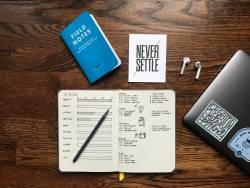
8 Life-Changing Ideas on How to Hold Yourself Accountable

Everything that is worth achieving does require hard work. There is no way around it. Lots of people have goals. If you are reading this, it’s likely that you have the drive to make yourself succeed. You probably already have your goals set. Make sure they are clear and they are meaningful to you. Some of you may even have your plan set. If you have come this far, there's good news and there's bad news. The good news is that you just need to execute your plan well to achieve your goal. The bad news is that making yourself execute the plan is the hardest stuff. Think about it. Goal and plan setting are important but they aren’t that difficult. Execution separates success from failure.
Like most things in life, holding yourself accountable is something that you can learn. There are different ways that can help you increase your chance of succeeding. The following are some of the best ways to hold yourself accountable. You may want to read about all of them and see which of them seem to fit you, then go ahead and try them. Being able to hold yourself accountable is a superpower.
Bullet Journal
You are not going to see a to-do list in this article. There are so many people that use a traditional to-do list and very few people execute their plan well. On the other hand, “bullet journal” can be viewed as a very special type of to-do list that is half-journal-half-to-do-list. “Bullet journal” is a very popular method of journal writing that makes your day effective and simple. There are two magical features about this method. First, it uses symbols like crosses and dots to make writing notes and tasks super easy and fun. Second, it has a concept called “migration” to force you to re-think whether something that hasn’t got done for many days is still important. If it’s not important, just forget about the task item and simplify your life.
Habit
Developing one habit at a time sounds cliche but it is really not if you know exactly how to do it. You have to know that a task becomes a habit when you do it daily for somewhere near 60 days. You have to know that developing one good habit is difficult enough, so don’t try to develop two habits at the same time. Instead, spend 60 days doing the same task daily. It will then become a habit and you won’t need willpower to do that task again. Then you can choose another daily task to do and do it daily for 60 days and it will soon turn into another habit. Now, how does habit relate to goal? If your goal is to finish writing a book by the end of the year, make “writing for 1 hour a day” a habit of yours and it will soon seem like writing a book is a result of your habit.
System Vs Goal
Scott Adams is the creator and artist of the famous comic strip Dilbert. If you have listened to his talk and read his book, you probably can tell that he is very intelligent and detail-minded. In his book “How to Fail at Almost Everything and Still Win Big”, he talked about how he thinks using systems is the way to achieve good things in life, instead of setting goals. What he means by “system” is “things you do everyday”. Instead of making your goal “finishing writing a book by the end of year”, create a system of “writing for 1 hour a day”. Only what you do daily can become habits and only habits are things you would do consistently without requiring a lot of willpower from you. It’s not that you don’t need to know where you want to go. It’s just that you should work backward from your goal and convert the goal into daily tasks.
Deciding Vs Wishing
The idea of “deciding vs wishing” is another great idea from Scott Adams’s book “How to Fail at Almost Everything and Still Win Big”. He mentioned in his book that there is a big difference between deciding to do something and wishing to do something. If you have decided to do something, figure out what it takes and do what it takes. If you don’t hold yourself accountable and don’t pay the price for success. That’s okay. Just be aware that you are wishing to succeed, not deciding to succeed.
“If you want success, figure out the price, then pay it.” - Scott Adams
Knowing “You Don’t Have a Choice” if You Want Success
In his book “It Takes What It Takes”, Trevor Moawad reminds people that if you have decided that you want to succeed, you don’t really have too much choice in life. For example, if you have decided you want to play professional basketball for 20 years, eating junk food is not an option. If you decide to succeed, you cannot choose to waste time on things that don’t move you forward. Knowing the fact that you don’t have a choice can make you more disciplined.
Beware of the Emotional Part of You
Awareness is a big part of making yourself do what you should do. Be aware that there’s an emotional part and a logical part in you. Be aware of the existence of the emotional part and don’t choose your action based on that part, at least not solely based on that part. Maybe it’s too difficult to tame the emotional part of you, but being aware of it and working with it can really give you a lot of benefits.
“When someone asks, ‘Why did I let myself eat all that cake?’ the answer is ‘Because the lower-level you won out over the thoughtful, higher-level you.’” - Ray Dalio
Stay Neutral
Don’t get too emotionally high and too emotionally low can make your work more stable and help you win in the long run. Trevor Moawad says in his book “It Takes What It Takes” that it takes “neutral thinking” to win. He mentioned that negative thinking works everything. It results in something bad. Positive thinking may be better, but it brings disappointment and isn’t really realistic. “Neutral thinking” is about setting goals, planning actions, and reacting realistically, without being too positive or too negative.
Make Principle-based Decisions
To make yourself more disciplined, be sure that you act according to your principles, not according to your emotion. Make this a habit. Principles are basically the guideline that you write for yourself when your mind is clear and calm. Taking actions according to your principles means that you are listening to the best version of you all the time.
“The most important thing is that you develop your own principles and ideally write them down, especially if you are working with others.” - Ray Dalio













